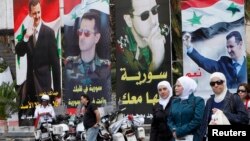MOSCOW —
Foreign Minister Sergei Lavrov signaled on Monday that Russia would oppose a U.N. resolution authorizing cross-border aid deliveries to Syria if it threatened to enforce it by military action.
The remark set the stage for a potential new showdown between Moscow and Western members of the U.N. Security Council, where Russia and China have blocked resolutions that would have condemned Syria's government or threatened it with sanctions.
Security Council members Australia, Luxembourg and Jordan have drafted a resolution that U.N. diplomats said would authorize cross-border aid deliveries into Syria at four points without government consent.
Diplomats have said the draft text falls under Chapter 7 of the U.N. Charter, which would make it legally binding and enforceable with military action or other coercive measures such as economic sanctions.
Lavrov said Russia was always ready to discuss aid but that “these issues must not be politicized or used as a pretext to inflame passions and mobilize public opinion in support of the need for foreign interference in the Syrian crisis.”
“These attempts are made primarily by trying to include citations of Chapter 7 … in Security Council decisions,” he told a news conference. “I think that is unacceptable, because we know what plans those who make such proposals have.”
Lavrov gave no details, but Russia has often accused Western and Gulf Arab nations of seeking pretexts for military intervention or imposing sanctions against Syrian President Bashar al-Assad's government.
He also said any resolution on aid access should adhere to international law which he said “envisions cooperation with the host country,” suggesting Russia would oppose the authorization of aid deliveries without government consent.
The remark set the stage for a potential new showdown between Moscow and Western members of the U.N. Security Council, where Russia and China have blocked resolutions that would have condemned Syria's government or threatened it with sanctions.
Security Council members Australia, Luxembourg and Jordan have drafted a resolution that U.N. diplomats said would authorize cross-border aid deliveries into Syria at four points without government consent.
Diplomats have said the draft text falls under Chapter 7 of the U.N. Charter, which would make it legally binding and enforceable with military action or other coercive measures such as economic sanctions.
Lavrov said Russia was always ready to discuss aid but that “these issues must not be politicized or used as a pretext to inflame passions and mobilize public opinion in support of the need for foreign interference in the Syrian crisis.”
“These attempts are made primarily by trying to include citations of Chapter 7 … in Security Council decisions,” he told a news conference. “I think that is unacceptable, because we know what plans those who make such proposals have.”
Lavrov gave no details, but Russia has often accused Western and Gulf Arab nations of seeking pretexts for military intervention or imposing sanctions against Syrian President Bashar al-Assad's government.
He also said any resolution on aid access should adhere to international law which he said “envisions cooperation with the host country,” suggesting Russia would oppose the authorization of aid deliveries without government consent.








